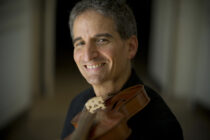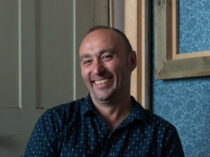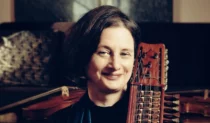Christ Church Cathedral
Subscriptions: To purchase tickets to this performance as part of a subscription to 3 or more concerts and receive a 25% discount off the full ticket price, please call Early Music Vancouver’s box office at 604-732-1610 or email boxoffice@earlymusic.bc.ca. Please note the subscription discount is not eligible in combination with other discount programs or on special events Rondeau and Tea Table Miscellany.
Artists: David Greenberg, violin; David McGuinness, keyboard; Kirsty Money, Nyckelharpa
Old fiddle tunes which are steeped in centuries of tradition have always been granted a special power and meaning, but how old are they? The two Davids have built a core repertoire of Scottish tunes which in the 18th century were both old and new, and they explore the relationships between these and other traditions: in the European art music of the time, in the fiddle music of Scandinavia, and in present-day folk composition.
This concert is generously supported by Eric Wyness.
PURCHASING TICKETS
Click here to purchase tickets.
To purchase tickets to this performance as part of a subscription to 3 or more concerts and receive a 25% discount off the full ticket price, please call Early Music Vancouver’s box office at 604-732-1610 or email boxoffice@earlymusic.bc.
PROGRAMME
William Christie
Pearlin Peggie’s Bonny, or, the Laird of Foveran
The Kail Reets of Fittie
The Warld’s gane o’er me now
Georg Muffat
Sonata violino solo
Fred Frith
Spring Any Day Now
Arto Järvelä, Timo Alakotila, Mauno Järvelä (JPP)
*Ellun sotiisi
Kruunupyyn katrilli
Laitisen Mankeliska
J.S. Bach
Gigue from Partita for violin no. 2 in D minor BWV 1004
David Greenberg
Deer John – A Cautionary Tail
Susan’s Reel
Alexander Reinagle
The Lee Rigg, with variations
Robert Bremner
Hit Her on the Bum
Nathaniel Gow
Johnny Cope
Robert Mackintosh
Sir Alexander Don’s Strathspey
Pat Riot
Miss Macleod of Macleod’s Reel
Miss Steel of Norwich’s Reel
Mrs. Dupree’s Reel
PROGRAMME NOTES
Traditions and history both connect us to the past. While history strives to understand what the past has left behind, traditions re-fashion that past for the present day, cherry-picking favourite bits and adapting them to suit the current circumstances. In some ways the two approaches have little in common, but in the realm of music they can be brought together to learn from one another. It makes little sense to play an 18th-century Scottish fiddle tune by only following the instructions found in Geminiani’s or Leopold Mozart’s violin treatises, but the information in these books can shed fascinating light on today’s fiddling practices and vice versa. Even the most pernickety of historical music specialists can’t help but be influenced by their own experience, and when we play historical music which now also survives in traditions, we can bring aspects of the two approaches together consciously. All of which is a very long-winded way of saying that our traditions of playing early music which have developed over the last few decades have got useful things to learn from folk music traditions too!
William Christie was a violinist and dance teacher from the village of Cuminestown in Aberdeenshire. Most of the tunes in his collection are his own compositions, but he also included many traditional tunes and airs, some unusual and not found elsewhere. He gave many of the tunes Italian tempo directions and indications of expression: of the tunes that we’re playing, Pearlin Peggie is marked Dolce, and the final jig Moderato. Christie also marked all of them as ‘Old’.
Composer Georg Muffat’s family left Scotland in the early 17th century to settle in Savoy near what is now the French border with Switzerland and Italy. He was one of the few composers to have spent time with both the all-powerful Jean-Baptiste Lully in Paris, and the equally celebrated Corelli in Rome, and he was fluent writing in the French and the Italian styles. His daring and experimental violin sonata dates from his time in Prague in 1677, and it combines the elegance and ease of French music in its opening and closing sections with the wild virtuosity associated with Heinrich Biber, resident violin virtuoso in Salzburg, where Muffat was about to take a post as organist and court composer.
Spring Any Day Now is a tune by the English guitarist, composer, and improviser Fred Frith, which dates from just before his move to New York City in 1980. For his album Gravity he recorded the two sides of the LP on either side of the ocean, and on Side 1 he collaborated with the Swedish group Samla Mammas Manna on tunes drawing on several European dance traditions. On the record sleeve he quoted Curt Sachs writing in 1937 about dance and what it is: “the victory over gravity, over all that weighs down and oppresses; the change of body into spirit, the elevation of creature into creator, the merging with the infinite, the divine.”
We’re joined by our long-standing friend and colleague Kirsty Money on nyckelharpa, not in the instrument’s usual Swedish repertoire, but in some Finnish tunes by three key members of the fiddle group JPP, founded in the district of Kaustinen, about 450km north of Helsinki. Despite having a population of only around 4000, in December 2021 Kaustinen’s fiddle playing tradition was inscribed to the Representative List of Intangible Cultural Heritage of Humanity by UNESCO: it was only the second entry on the list from Finland, the first being sauna culture!
David Greenberg’s Cape Breton-Baroque Integration (CBI) approach to violin playing builds on the combination of techniques & timing, as well as the pairing of Baroque and trad-style tunes. He composed Deer John & Susan’s Reel for his friends and former Haligonian housemates: John was lucky in a highway encounter with a deer (the deer not so much), and the tune reflects John’s love of Blues, while the Reel danced its way into Susan’s heart with its Celtic-Klezmer flavours.
The rise in the popularity of the piano as a middle-class domestic instrument at the end of the 18th century also led to a boom in the publication of music for performance at home, and piano variations on popular tunes were a particular favourite for young ladies to display their accomplishment in having acquired some seriously skilled piano technique. This set of variations by Alexander Reinagle first saw light in a book of Scots Tunes for harpsichord published by him in Glasgow in 1782, and he reworked it a few years later after settling in Philadelphia and becoming the first musician in North America to direct an opera from the fortepiano.
Publisher Robert Bremner’s Curious Collection of Scots Tunes with variations of 1759, makes explicit the connections between the developing Scottish fiddle traditions and the division violin repertoire familiar from English 17th-century music, and material from Bremner’s book was reworked again later as piano music by Nathaniel Gow, for his Ancient Curious Collection of Scotland, which was dedicated to Walter Scott. Here even John Come Kiss Me Now, based on the Renaissance passamezzo moderno, was considered a ‘Genuine Scotch Tune’, in the interests of constructing a strong sense of Scottish culture and identity for the 1822 visit of George IV to Edinburgh and the Highlands. In some later collections, the tune that we’re playing from Bremner has its title changed to Hit Her on the Thumb – this sounds like it could be an obscure courtship ritual or a public shaming from the kirk, but it’s really only a half-hearted attempt at Victorian prudishness.
Johnny Cope is a Jacobite song ridiculing Sir John Cope, whose government troops suffered a humiliating defeat at the Battle of Prestonpans in 1745. The chorus ‘Hey Johnnie Cope, are ye wauking yet?’ (‘Are you awake yet?’) has been the subject of some unfortunate misprints since the 1864 Breitkopf edition of Beethoven’s arrangement of the song misread the ‘u’ in ‘wauking’ and printed it upside down. At least one recording of the song follows this with unintentionally hilarious conviction, in all five verses.
Robert ‘Red Rob’ Mackintosh was born in Tulliemet in Perthshire, and from the 1770s on his talent for the violin led him in turn to Edinburgh, Aberdeen and London. Despite some skill in composition, a formidable technique, and connections with the best of London musicians, he was never quite taken seriously enough by the Edinburgh Musical Society to be granted the position at the front of their orchestra – they preferred the kudos of having an Italian concertmaster. After a frustrating season leading the orchestra in Aberdeen, after which he was demoted to the second violins, he eventually left for London. While his classical compositions are full of personality, it’s in his fiddle tunes and their endlessly inventive basslines that his unique musicianship really shines.
- David McGuinness with David Greenberg

David Greenberg, violin
For three decades, David has enjoyed a double career as a Baroque violinist and Cape Breton fiddler. His fluency and experience in these two genres makes him uniquely qualified to interpret the wild music of 18th-century Scotland.
David is a graduate of Indiana University’s Early Music Institute, where he studied with Stanley Ritchie. He has performed, taught, and recorded primarily in North America and Western Europe, as well as in Australia, New Zealand, and the Far East.
David has performed with Tafelmusik, Red Priest, Les Musiciens de Saint-Julien, Concerto Caledonia, Apollo’s Fire, Ensemble Caprice, La Nef, Toronto Consort, Seattle Baroque, Les Voix Humaines, Chris Norman, Suzie LeBlanc, Doug MacPhee, and Musica Pacifica. He has performed as guest soloist/director with several orchestras, including the Calgary Symphony Orchestra and Symphony Nova Scotia.
He has recorded over 80 CDs, including with most of these ensembles and collaborators, as well as three groundbreaking Scottish-Cape Breton-Baroque recordings with his own ensemble Puirt A Baroque in the 1990s.
David co-authored The DunGreen Collection (1996), an influential treatise on Cape Breton fiddling. He is also a composer and arranger. Many of his tunes have been recorded by Cape Breton musicians such as Buddy MacMaster, Carl MacKenzie, Jerry Holland, and The Rankins.
David enjoys sharing his passion and knowledge about Baroque and Cape Breton music in workshop settings. His current solo touring program is called Bach & Tunes: Multiple Voices for One.

David McGuinness, keyboard
David McGuinness divides his time between historical Scottish music and contemporary work. As director of early music ensemble Concerto Caledonia he has made fifteen albums, mostly of newly-rediscovered repertoire, and collaborated with musicians in a variety of genres from folk to punk cabaret.
Recently he has been playing historical pianos in traditional music: 2018’s What News is a collection of traditional Scots ballads with the singer Alasdair Roberts and sound artist Amble Skuse, and in 2022 he recorded an instrumental album with concertina player Simon Thoumire. In the ongoing performance project Nathaniel Gow’s Dance Band, Concerto Caledonia plays late 18th-century Scottish dance music while the audience dances the original figures.
David has been a music producer and composer for television and radio, most notably on several seasons of E4’s TV drama Skins. In 2007 he produced John Purser’s 50-part history of Scottish music for BBC Radio Scotland and co-ordinated the station’s observance of No Music Day with the artist Bill Drummond. In 2019 Sony Music reissued the Prefab Sprout album I Trawl the Megahertz, for which he provided the string arrangements.
He is Senior Lecturer in music at the University of Glasgow, and was principal investigator on the AHRC-funded research project Bass Culture in Scottish Musical Traditions. 2022 sees the publication of his edition of the music for Allan Ramsay’s ballad opera The Gentle Shepherd for Edinburgh University Press, and a recording with Concerto Caledonia of Ramsay’s songs.

Kirsty Money, nyckelharpa
Originally from BC, Kirsty studied violin with Sydney Humphreys at the Victoria Conservatory of Music, and has further degrees from McGill and Western Universities, as well as her LRSM (UK). Currently she is a member of the first violin section of Symphony Nova Scotia. However, she plays more than just the modern violin!
While studying in Montréal, she was introduced to the Baroque violin, and this has led to collaborations with Early Music musicians like David Greenberg (Tempest Baroque Ensemble), Suzie Leblanc (Early Music Vancouver), Jeanne Lamon (Tafelmusik), Alex Weimann (Pacific Baroque Orchestra), Kati Debretzeni (English Baroque Soloists) and David McGuinness (Concerto Caledonia, Scotland).
Her interest in Early Music and living with the Folk Traditions in Nova Scotia, has also inspired her to take up playing the Swedish Nyckelharpa, an instrument dating from Medieval Northern Europe. Since 2015 she has been studying the instrument and its traditional repertoire from Sweden intensely. Through grants from the Canada Council and Arts Nova Scotia she has been to nyckelharpa workshops and festivals in Sweden, the UK and Germany. Principal mentors include Olov Johansson, Josefina Paulson, Magnus Holmström, David Eriksson, and Vicki Swan.
Her intention is to bring the amazing depth of sound and versatility of the nyckelhapra to audiences in Nova Scotia, and to the rest of Canada.


